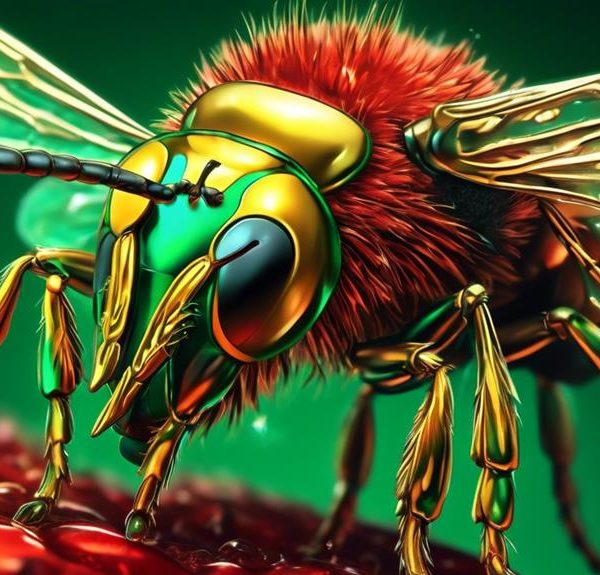Yearning for a sweat bee-free summer? Uncover the surprising scents that repel these pesky insects and reclaim your outdoor enjoyment.

What Smell Do Sweat Bees Hate
Navigating the world of sweat bees can be a labyrinth of confusion and missteps. You're probably aware of their penchant for human perspiration, but have you ever wondered what odors these tiny insects find repulsive? Discovering the smells that sweat bees can't stand may be your golden ticket to keeping them at bay.
It's not just about the inconvenience or mild discomfort they cause; for some folks, sweat bee stings can trigger allergic reactions. So, armed with the knowledge of what scents repel these pesky insects, you might just save a summer afternoon from becoming a swarming nightmare.
But what are these scents, and how can you use them effectively? Let's pull back the veil on this intriguing topic.
Key Takeaways
- Certain essential oils, such as citronella, peppermint, lavender, eucalyptus, and tea tree oil, can repel sweat bees.
- Diluted essential oils, particularly citronella, lemongrass, and peppermint, are effective in deterring sweat bees.
- Sweat bees are repelled by citrus scents derived from lemons, oranges, and grapefruits.
- Incorporating citrus-based products, such as lotions or sprays, into your daily routine can effectively ward off sweat bees.
Understanding Sweat Bees

Diving into the world of sweat bees, you'll find that these tiny insects, scientifically known as Halictidae, are a fascinating study due to their unique behaviors and adaptations. They're not your ordinary honey-making creatures. These bees are small, usually under half an inch in length, and their metallic-tinted bodies are often mistaken for flies.
Sweat bees get their name from their attraction to human sweat, which they'll lap up for its salt content. It's an odd quirk, but a survival one, as these insects thrive in environments where salt is scarce. However, don't worry, their sting is minor, only utilized when threatened.
Despite their affinity for sweat, they're primarily pollinators, playing a crucial role in maintaining biodiversity. They've adapted to a solitary or communal lifestyle, unlike their hive-centric relatives, leading to a wide variety of nesting habits. Some species burrow into the ground, while others prefer rotting wood.
Intriguingly, their social structure varies by species, with some displaying a rare form of cooperative behavior known as eusociality. This involves a division of labor among individuals, with only certain females reproducing while others work. A thorough understanding of sweat bees provides insight into the complex world of insect interactions and survival strategies.
Essential Oils Sweat Bees Dislike

While sweat bees are undeniably drawn to the salty allure of human perspiration, they're decidedly averse to certain essential oils, which can be used as a natural deterrent. These oils, derived from plants, possess certain compounds that are unappealing to the olfactory receptors of sweat bees.
Here's a table listing some essential oils that sweat bees tend to dislike:
Essential Oil | Source Plant | Key Repelling Component |
|---|---|---|
Citronella | Lemongrass | Geraniol |
Peppermint | Mint | Menthol |
Lavender | Lavender | Linalool |
Eucalyptus | Eucalyptus | Eucalyptol |
Tea Tree | Tea Tree | Terpinen-4-ol |
Natural Repellents and Their Effectiveness

Building upon our understanding of essential oils that deter sweat bees, let's now examine the effectiveness of these natural repellents in practical, real-world scenarios.
It's important to remember that the success of these repellents heavily relies on their correct application and consistency of use.
Research indicates that essential oils such as citronella, lemongrass, and peppermint, when diluted and sprayed around your property, can effectively deter sweat bees. Citronella oil, in particular, has shown significant effectiveness due to its strong, pungent smell that disrupts the sweat bees' olfactory system, causing them to avoid the area.
However, it's not a one-size-fits-all solution. The effectiveness of these oils can vary based on factors such as the species of the sweat bees, the concentration of the oil, the frequency of application, and the surrounding environment. For instance, sweat bees in humid climates may be more persistent and less deterred by these essential oils.
In addition, some sweat bees may become desensitized to the smell over time, reducing the deterrent effect. Therefore, it's recommended to rotate between different essential oils to maintain their effectiveness. Moreover, combining these natural repellents with other preventive measures can significantly increase your success rate.
Sweat Bees and Citrus Scents

In the realm of natural repellents, citrus scents, particularly those derived from lemons, oranges, and grapefruits, have shown promising potential in driving away sweat bees. The anti-attractant properties of these citrus scents are largely due to their chemical composition, which includes elements like limonene and citral. These compounds have been scientifically proven to repel various insects, including sweat bees.
You might wonder how citrus scents actually work against these bees. Well, the answer lies in the potent olfactory senses of sweat bees. The smell of citrus is highly pungent and overpowering for them. In fact, these insects interpret citrus as a 'danger' signal, causing them to flee from the source of the scent.
But how can you use this knowledge to your advantage? It's simple. You can use citrus-based products, such as essential oils or sprays, in your garden or around your home. By doing so, you'll create a scent barrier that's unattractive to these pests.
Implementing Scent-Based Deterrent Strategies

To effectively ward off sweat bees using scent-based deterrent strategies, you'll need to incorporate citrus-based products into your daily routine. This is due to the specific olfactory aversions of sweat bees, notably their aversion to citrus scents. The implementation of these strategies can be as simple as applying citrus-scented lotions or sprays.
Scientific studies show that sweat bees, like many insects, are highly sensitive to smells. Their antennae function as powerful olfactory organs, enabling them to detect and respond to a variety of scents. Citrus-based odors, in particular, have been found to repel sweat bees effectively.
The application of citrus-based products is a non-toxic, environment-friendly method to deter these bees. Moreover, this strategy is cost-effective and easily incorporated into your daily routine. You can choose from a wide array of products, from essential oils to body lotions, all having a citrus base.
Conclusion
In conclusion, sweat bees detest certain scents, particularly those from essential oils and citrus. Natural repellents, like peppermint and eucalyptus oil, prove effective against these persistent pests.
Citrus scents, too, serve as strong deterrents. Implement these scent-based strategies wisely to keep sweat bees at bay.
Remember, understanding these creatures is key to managing their presence effectively.


